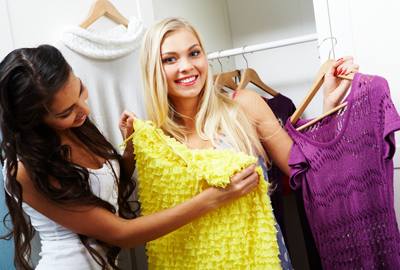
Jessica Althoff’s lifestyle has always been decidedly eco-friendly.
She sends her packages in recycled boxes rescued from the local supermarket. Her meeting notes are printed on the back of junk mail. And when the backdoor of her Point Loma home needed replacing, she commandered the old door and turned it into a desk.
So when Althoff decided to go into business for herself, she put her passion into play with the creation of Future:Standard, an online women’s boutique that provides “ethical” clothing and accessories.
Althoff, 33, got the idea for the new company last year while pursuing her MBA in Corporate Social Responsibility at USD. The website offers only brands that are eco-friendly, fair trade, humanitarian, locally made or, as Althoff puts it, “in some way made with respect to the planet and those who are making the products.”
And for those who think eco-friendly just might translate into eeeek-o ugly – recycled grass skirts, anyone? – think again. The company’s goal is to shift consumer demand to ethical products by offering style, as well as philosophical substance, said Althoff.
“Values should not get in the way of looking great,” said Althoff, laughing. “There are a lot of really beautiful options out there.”
Among Future:Standard’s offerings: an $18 PACT thong – the brand uses organic cotton and donates a portion of profits to enviromental groups – and a $75 linen tank dress from Covet.
There is an estimated $3 billion market for “sustainable” apparel, according the the Natural Marketing Institute. And major corporate players such as Nike, Timberland and Patagonia have all staked a claim.
Jacquelyn Ottman, a marketing consultant and author of “The New Rules of Green Marketing,” said consumer demand is steadily shifting toward green as more focus is placed on the environment and more green products come on the market.
But it isn’t a sure sell, she added. Green companies have to promote the practical value of their products, not just the earth-hugging aspect.
“The market is big, but just because it’s big doesn’t mean a company will necessarily do well,” said Ottman. “The product has to be right, the price has to be right, the consumer target has to be right, the marketing position has to be right.”
Althoff says her business has grown steadily since Future:Standard launched in January, and she expects to be profitable by the end of the year. The website now offers 18 brands, including Covet, ecoSkin, Alex and Ani, Threads for Thought, and Yana K.
But hurdles, such as consumer awareness and price, remain.
“People do want eco-friendly, humanitarian alternatives, but unless it is in their face, very few people seek it out,” said Althoff.
“And price remains a barrier,” said Althoff. “Organic cotton is more expensive to grow so organic shirts are more expensive, and it is more expensive to pay someone a living wage for a product then to not pay it.”
Article Courtesy of: http://www.signonsandiego.com

